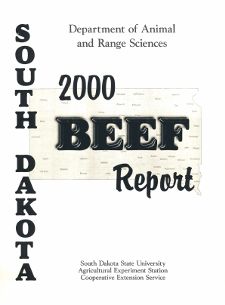Document Type
Report
Report Number
2000-5
Publication Date
2000
Keywords
feedlot, steers, crude protein
Summary
An experiment was conducted to determine if dietary metabolizable protein (MP) could be manipulated to reduce N content of feedlot effluent without compromising production rates in yearling steers fed high grain content diets. Three feeding programs included: LO) 11 % CP fed throughout; HI) 13% CP fed throughout; and LHL) 11 % fed from d 1 to 35, 13% CP (HI) fed d 36 to 94 and 1 1 % CP (LO) fed from d 95 to 1 17. An estradiol-trenbalone acetate implant was administered on d 35. There were 5 pens of 8 steers (BW=7561b) assigned to each treatment. The MP allowed ADG for the diets were 3.3 and 4.0 Ib for the LO and HI diets respectively. Cumulative ADG and feed efficiency were improved (Pc.05) by feeding the HI diet. Fluctuations in interim growth rates obscured the determination of specifically when this effect occurred. The faster growth rate was associated with heavier and fatter carcasses. An evaluation of serum urea-N concentrations suggested that the influence of the growth promotant on N metabolism was beginning to diminish within 56d. The HI diet caused higher (P< .05) serum urea-N levels at 63, 91 and 117d on feed. Total N intake was calculated by pen and increased (P< .01) from 41.4 to 47.3 to 51.2 Ib/steer for treatments LO, LHL and HI respectively. The N intake1100 BW gained increased (P< .01) from 9.89 to 10.90 to 11.33 Ib for LO, LHL and HI treatments respectively. These results indicate that increasing production efficiency by elevating the MP content of diets may not cause a concomitant improvement in the efficiency of N retention on the feedlot scale.
Number of Pages
6
Format
application/pdf
Language
en
Publisher
South Dakota State University
Rights
Copyright © 2000 South Dakota State University
Recommended Citation
Pritchard, R. H.; Bruns, K. W.; and Bierman, S. J., "Influence of Dietary MP on the Production Rates and N Usage by Steers Fed High Grain Content Diets" (2000). South Dakota Beef Report, 2000. 6.
https://openprairie.sdstate.edu/sd_beefreport_2000/6

